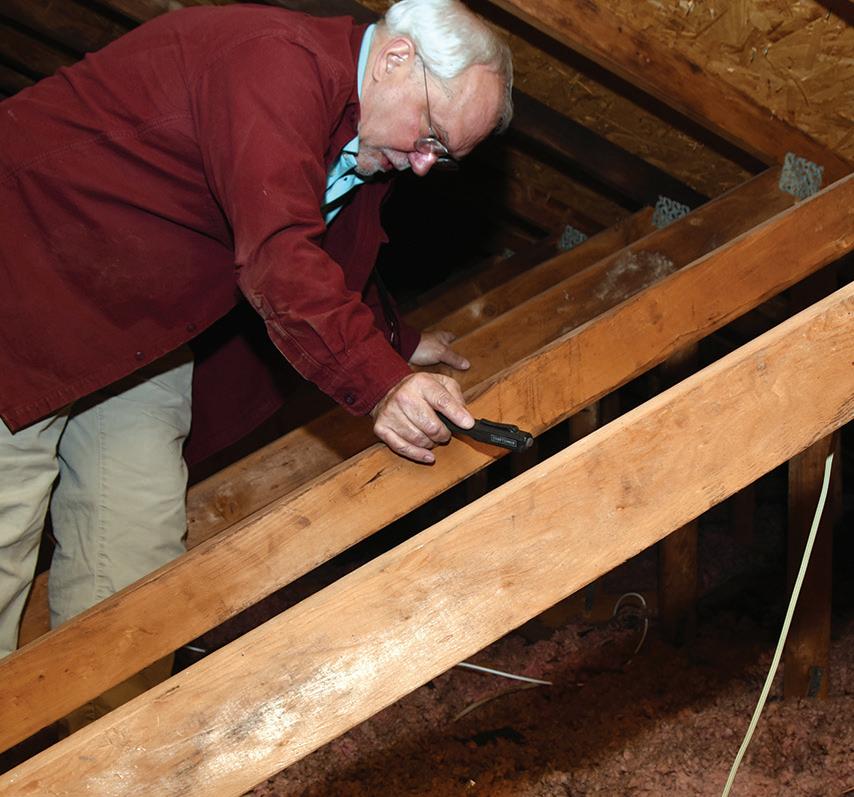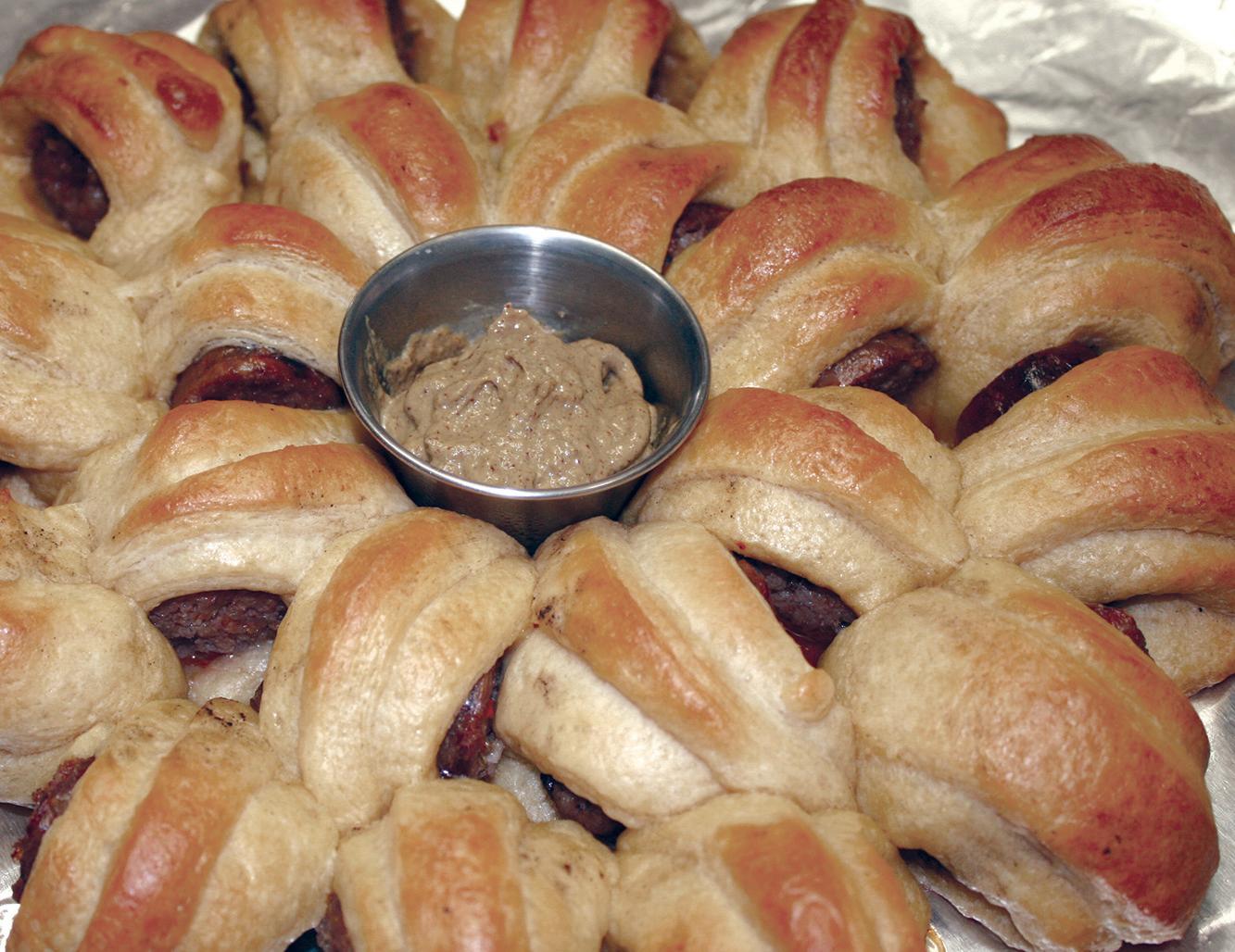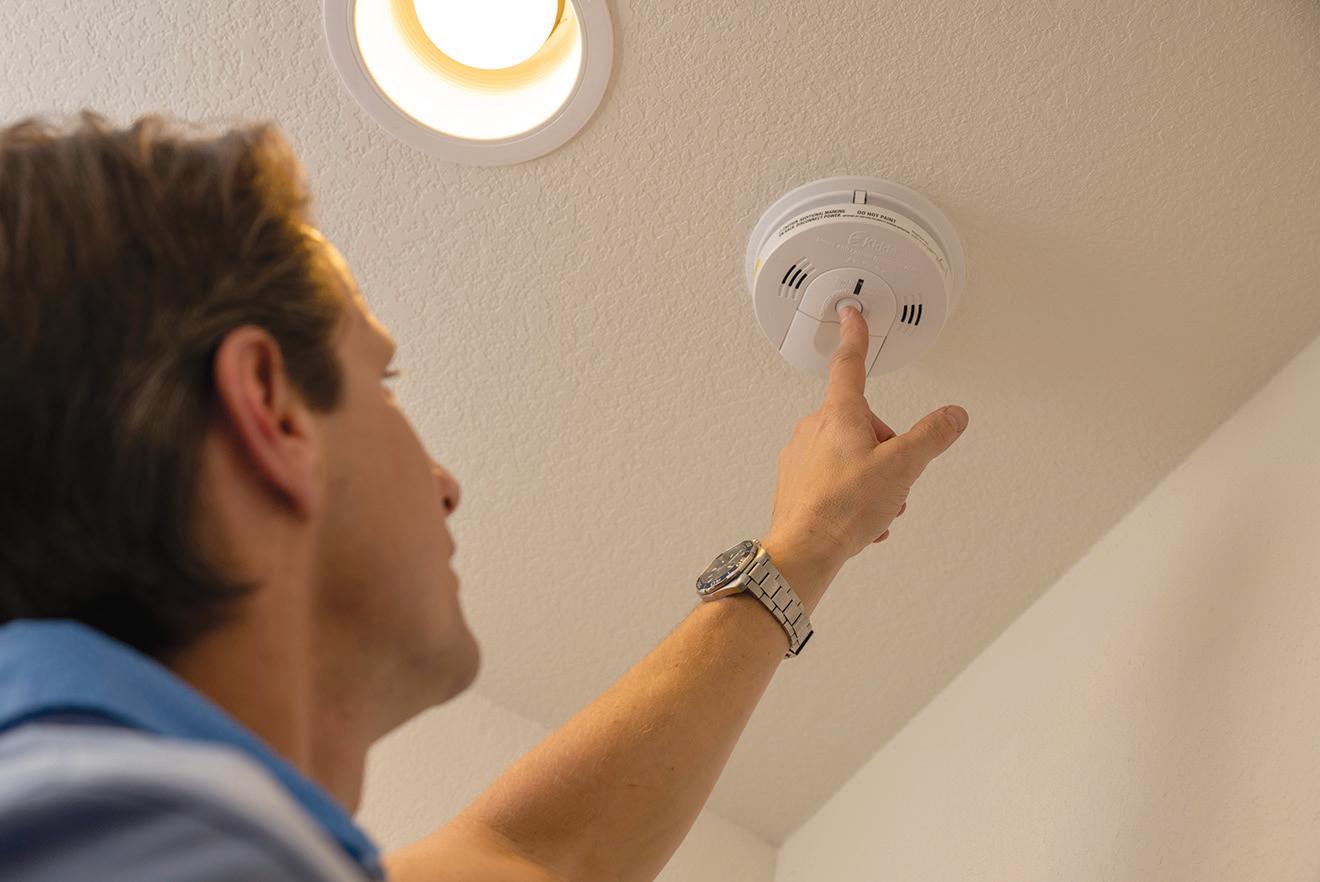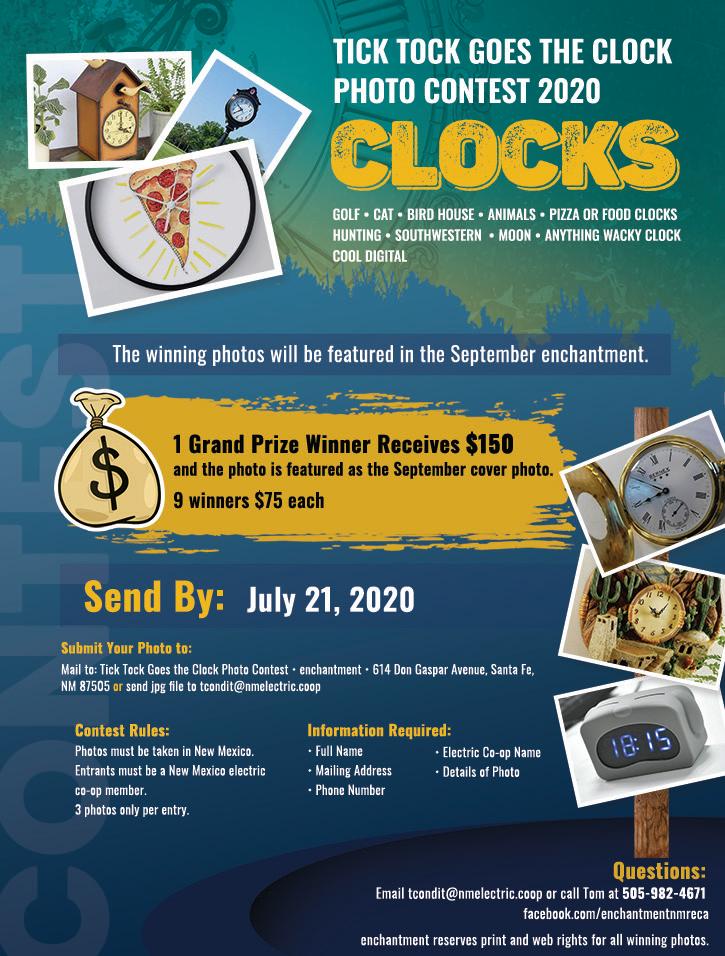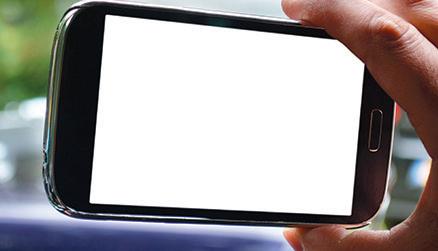
9 minute read
The Healing Power of Animals
By Ariana Kramer
Judy Schneider and Einstein at Healing Through Horses.
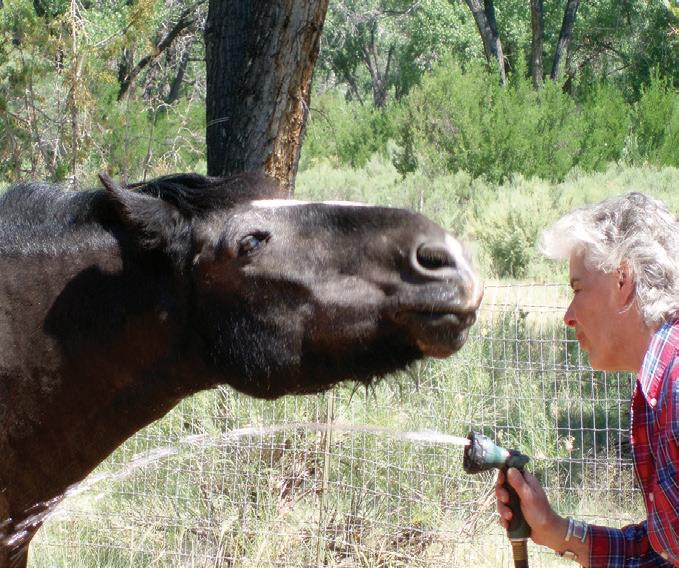
Note: The story and photos were written and taken prior to the COVID-19 pandemic. Ariana provides readers with an update as of May 2020. T he human-animal bond is strong. It also heals. If I have a difficult day my dog, Shlomi, will lick my face and place her paw on my arm to let me know she’s there. When he was still alive, my pit-bull mix, Amigo, would curl his body next to mine and cover me with kisses. Over and over again, the companion dogs and cats I have lived with—and other animals who have crossed my path—have helped me through rough moments. So, when I was diagnosed with post-traumatic stress disorder (PTSD) six years ago, it was natural for me to turn to animals for help.
Trauma and PTSD Basics
The term “trauma” comes from the Greek word for “wound.” The American Psychological Association defines trauma as “an emotional response to a terrible event like an accident, rape or natural disaster.” Healing takes time, but a few months after experiencing or witnessing a traumatic event, most people can resume their normal activities and functioning.
However, some people develop a condition known as post-traumatic stress disorder. The term was first used in 1980 in the third edition of the Diagnostic and Statistical Manual of Mental Disorders published by the American Psychiatric Association. PTSD is commonly associated with the Vietnam War and its veterans who returned home. Earlier terms for the same phenomenon include “shell shock,” “soldier’s heart,” and “battle fatigue.”
We now know PTSD is an anxiety disorder that affects people of all ages, genders, and backgrounds. The onset of symptoms can happen months or years after a traumatic event. Research shows it is unlikely the symptoms of PTSD will resolve on their own without treatment.
The good news is that there is help. According to the National Center for PTSD, run by the U.S. Department of Veterans Affairs, effective treatments include trauma-focused psychotherapy and medication. Numerous studies show another effective PTSD treatment is animal-assisted therapy in which a trained therapist or animal handler works alongside a dog, horse or other animal to provide support for a person.
Healing through Horses
I found Judy Schneider and her animals through serendipity. A friend of mine had picked up a Healing Through Horses brochure and shared it with me. Schneider lives in Abiquiu. My friend and I drove to attend one of Schneider’s all-women retreats with horses. I was hesitant at first because it was difficult for me to be among groups of people, but Schneider welcomed me warmly. With the horses looking on, I soon felt my anxiety lessen.
In the months that followed, I worked with Schneider and her horses in group settings as well as one-on-one. I bonded with Buster, a large sorrel draft horse who beamed strength and solidity. Then there was Einstein, a mischievous black horse who liked to knock people’s hats off and play other tricks. Other horses included Jack, Madonna, and Guapito.
PTSD can cause a person to feel different and distanced from others, leading to social isolation. In my own case, acceptance by the horses helped to alleviate this. If the horses could accept me, maybe I could accept myself—and maybe other people would accept me, too.
I remember one day when Schneider asked me if I would like to climb onto Buster’s back. This was unusual, but I did it. Then, she suggested I lie down on Buster’s bare back. This was even more unusual. I lowered myself down, placing my spine against his, my chest open to the sky. I felt the horse breathe under me, and my whole body relaxed. His broad back supported me completely. It felt like I was lying on a warm beach or a whale—lulled by the gentle rise and fall of Buster’s breathing.
It was a strong reminder of the support I have in this world, even when I cannot feel it. Buster gave me hope in the natural rhythms of life again and in my abilities to heal from my wounds.
Schneider, a licensed social worker, has worked as a therapist since 1986. She founded Healing Through Horses in 2007 to inspire wellness through the power of the equine spirit. Schneider says horses can help those who have PTSD because the animals are wellgrounded and tune in quickly to what is going on with a person.
Schneider gave an example of how she might work with a woman with PTSD, who was feeling overwhelmed. She might have the woman walk in the corral among the horses. As her heart rate drops and becomes calm, the horses may feel safe enough to approach, positively reinforcing the woman’s behavior.
For someone showing signs of distress, Schneider might guide the person to place their hands on one of the horses.
“Eventually, they will come back to themselves because they have contact,” Schneider says.
For some people, the size of the horses and their power can be frightening, even terrifying. Schneider told a story of a young girl in foster care who came to see her for therapy. The girl had been hurt by the adults in her family of origin. The horses were another large, ominous presence to her. The girl was so frightened of the horses she expressed anxiety whenever she came near one.
“She thought anything bigger than her was going to kill her,” says Schneider. “Eventually, she learned that big people—adults—are not all dangerous. But she only learned that through the horse. That was what we worked on for a long time. Touch the horse, and you survive. Brush the horse, and he likes you, he doesn’t move away, he’s not going to hurt you. For her, that was
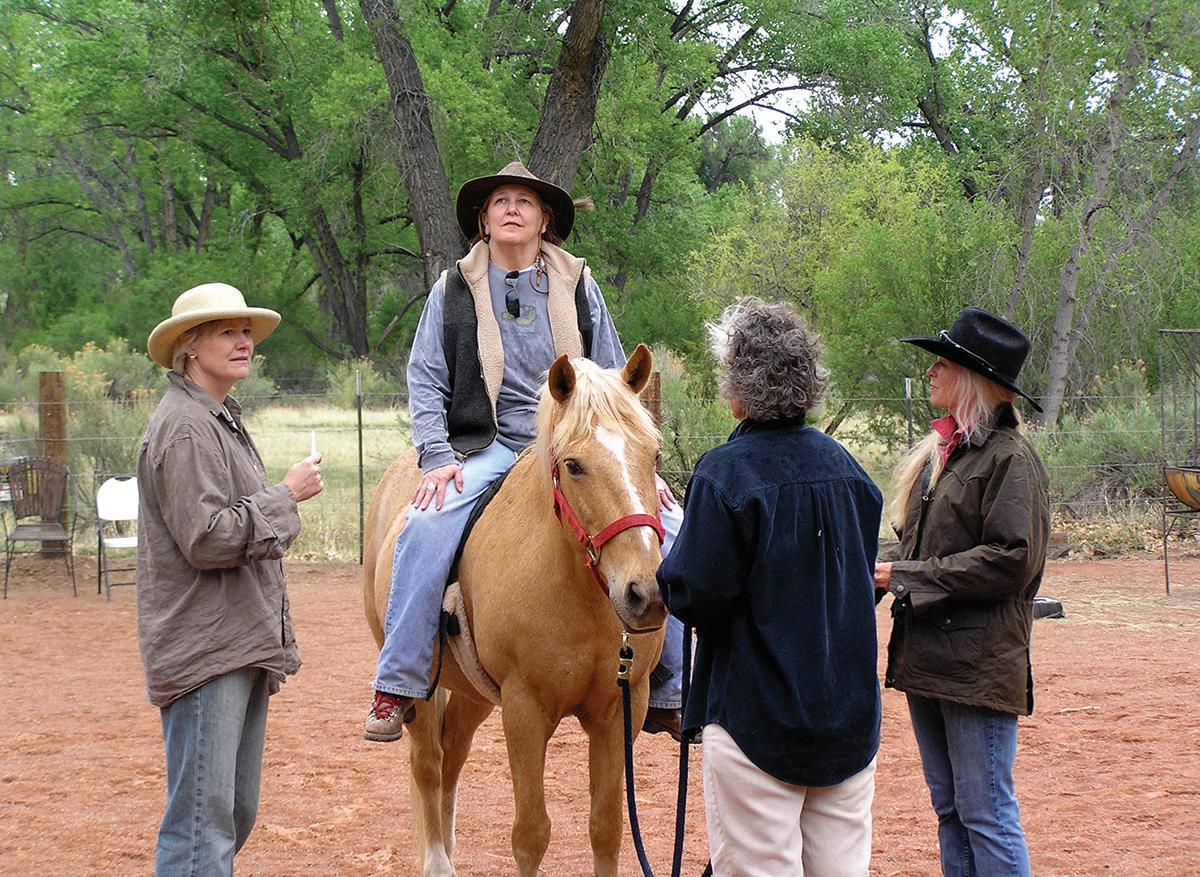
A woman asking for guidance at Healing Through Horses. monumental.” Eventually, the girl was able to get up on the horse.
“It was a surrendering,” says Schneider. “She surrendered to the fear of death. She learned that trusting something is okay.” The girl not only conquered her fear but she also made friends. The horses would follow her around, says Schneider. They became her companions and confidants.
Canines to the Rescue
Across the country, another woman is immersed in the healing power of dogs. For 25 years, Marni Bellavia has worked with the Humane Society of Broward County in Florida. Her title is the Manager of Animal Assisted Therapy, and she trains volunteers and their companion animals to provide comfort to those in need of extra support. The program serves three counties and helps people in hospitals, hospice settings, senior retirement homes, mental health care facilities, children’s facilities, foster homes, group homes, libraries, and schools.
On Valentine’s Day 2018, Bellavia heard the news of the shooting at Marjory Stoneman Douglas High School that took place in Parkland, only 30 minutes away. She sprang into action. The very next day, she had dog-and-person teams deployed to the high school as well as nearby schools where they could offer support for students, faculty and families. Throughout the year, 20 teams attended community vigils, visited people at their homes, came to school, and continued to be a resource for those affected by the shooting.
There was a profound loss of hope, says Bellavia. “Most of the kids, honestly, didn’t want to talk to anybody. I mean, it was horrific,” Bellavia emphasizes.
Working with the counselors and psychologists at the school, Bellavia and her teams took the dogs to therapy sessions. With the animals present, students were able to cry and talk to the animals about what had happened and how they felt. The dogs worked with students individually and sometimes with groups.
“The animals were providing comfort and that unconditional love and nonjudgment that you don’t normally get from people,” Bellavia explains.
Though Bellavia responded to the school shooting by making her dogand-person teams available to others, she was working in new territory. It made her realize there was not yet an animal-based trauma-response effort that could serve her community. She knew that needed to change.
On a sleepless night, about two weeks after the shooting, Bellavia came up with the idea for the Canine Community Resilience program. The new program provides canine sup-
port to 911 dispatchers, first responders, and those affected by traumatic events such as a fatal car accident or domestic violence situation. Bellavia partnered with fire stations and police departments and the Broward County Sheriff’s Office to develop the program. Together, they trained dogs and their handlers to be able to participate in traumatic situations. The dogs learned how to tolerate, adapt, and cope with the physical and emotional stress that comes with a crisis.
The Canine Community Resilience Program was born out of the horror of the Parkland shooting, and a dog named Karma played a part in it. Karma is Bellavia’s own companion dog and has worked next to her for years, providing love and healing to others. Bellavia says watching Karma, and her other dogs comfort people in need has been profound.
“It means everything to me,” she stresses. “It’s the reason I continue to do this work 25 years later. It’s the reason I dedicated my life to animals that can help people. It takes a special animal to be able to intuitively be that for other people. What I saw my dog doing at the high school has completely revamped everything I’ve thought about animals, and I’ve been doing this, literally, my whole life.”
Bellavia says Karma had an innate ability to seek out people who needed her support. “She felt it,” says Bellavia. “She went to them. It was just an amazing, beautiful thing.”
For More Information
Humane Society of Broward County’s Animal Assisted Therapy www.humanebroward.com/programs/animal-assisted-therapy Healing Through Horses www.healingthroughhorses.com

Story Update
Since this story was first written much has changed. My sweet dog, Shlomi, passed away. I adopted two cats from our local animal shelter: Leopold and Liebchen. And, the coronavirus pandemic has unfurled. I reached out to Judy Schneider and Marni Bellavia to find out how they are faring in these times, and how the pandemic has changed their work.
Judy Schneider of Healing Through Horses, says “Like many service providers, we have been impacted by COVID-19. We have had to reschedule all of our group retreats, women’s circles and drop-in visits with the horses.”
Schneider is holding a three-day virtual equine-inspired art retreat this summer, and is planning a six-day, women’s retreat, co-facilitated by artist Tiffani Gyatso at the historic Rancho de la Osa in Arizona for November 9-14. She is also offering private therapy/coaching sessions at Healing Through Horses while practicing physical distancing following CDC guidelines. Her current equine healing helpers are Madonna, Guapito, Stella, and Rosa. Details about Schneider’s activities can be found at www.healingthroughhorses.com.
Marni Bellavia says the Canine Community Resilience Program is suspended due to the coronavirus. I asked Bellavia how her own therapy dogs, Karma and Bodhi, are doing these days.
The Humane Society of Broward County’s Animal Assisted Therapy Program offers virtual visits and video chats for those who could use a special pick-me-up. For a donation, they will drop in a video call for a maximum of 10 minutes. These wonderful therapy animals are ready to provide support to first responders, virtually visit a hospital room, or help celebrate a birthday, or other occasion. For more details, visit humanebroward.com/zoomies.


